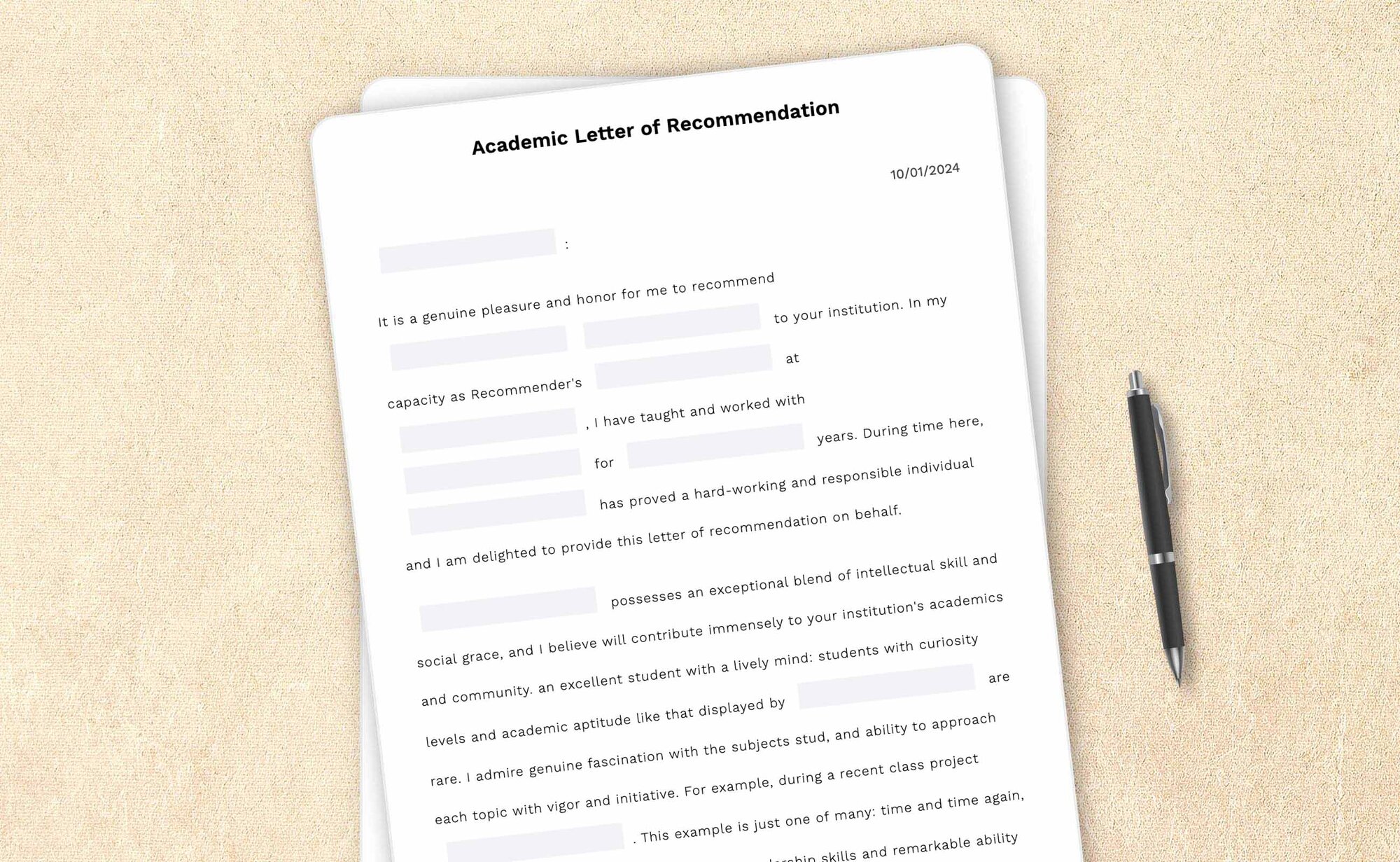It is a genuine pleasure and honor for me to recommend
| Sincerely, | |||||||||||||||||||||||||||||
____________________________________ |
|||||||||||||||||||||||||||||
How-to guides, articles, and any other content appearing on this page are for informational purposes only, do not constitute legal advice, and are no substitute for the advice of an attorney.
Academic letter of recommendation: How-to guide
How can you differentiate yourself in a world full of competition? The answer is a letter of recommendation. When it comes to job applications, college admissions, and scholarship applications, these letters can help you make the right impact.
These letters are testimonies filled with accounts, facts, and sincere recommendations. They provide a clear image of your personality, your abilities, and your potential that goes beyond your academic record or professional background.
Now, let's take a closer look at these letters and see how they boost your reputation, provide you with fresh prospects, and eventually help you achieve success.
What is an academic letter of recommendation?

A recommendation letter is a written endorsement provided by an individual familiar with the applicant's academic or professional performance. It aims to comprehensively assess the applicant's abilities, character, and potential.
Letters of recommendation are very important in both professional and academic contexts. They provide a tailored recommendation, highlighting the applicant's advantages and fitness for the intended position.
When do you need a recommendation letter?
1. College applications
Letters of recommendation are essential for students' admission to universities since they provide information about a student's abilities. These letters from a teacher or a professor assist admissions committees in determining students' fitness for their university or school, whether the candidate is seeking an advanced degree program or an undergraduate program.
2. Scholarship applications
When it comes to scholarship applications, reference letters are strong testimonials that increase the likelihood that the candidate will be awarded financial help. They offer insightful information about the applicant's accomplishments, personality, and chances of success.
3. Employment applications
Letters of recommendation are equally important when applying for jobs in organizations, particularly for young graduates or people changing fields. They give potential employers an idea of an applicant's work ethic, character, and professional qualities.
Why are academic letters of recommendation important?
Establish credibility
An academic recommendation letter serves as a strong testimonial that establishes the applicant's qualifications. These letters prove the applicant's talents, highlighting their accomplishments, skills, and character and demonstrating their qualification for the desired position. In general, they confirm an applicant's potential and competence in the eyes of potential employers, scholarship committees, and admissions committees.
Personal endorsement
Recommendation letters provide more than just credentials;
- They're a sincere endorsement or a glowing recommendation from those who have personally seen the applicant's academic or professional experience and wish to give a good impression.
- Because it is based on real-life events and conversations, this personal testimony is credible and authentic.
- Giving details about the applicant's personality, work ethic, and chances of success humanizes the application process.
In short, these letters convey much about the applicant's value as a candidate and go beyond simple formalities.
Where to obtain academic letters of recommendation?

1. From professors and teachers
It is important to have reference letters from teachers who can offer accurate evaluations of students' moral character and intellectual aptitude. These letters provide insightful viewpoints on the applicant's academic background and prospects.
2. From supervisors and employers
Employers' or supervisors' recommendation letters emphasize the applicant's abilities, work ethic, and contributions in a work environment. They provide businesses with insightful information about an applicant's professional skills and fit for the desired role.
3. From advisors and mentors
Letters of recommendation from mentors or counselors provide unique insights into the candidate's personal evolution. These letters significantly strengthen the applicant's profile by comprehensively assessing their character, abilities, and potential.
How to write an effective academic letter of recommendation?
When it comes to crafting an impactful recommendation letter, following a structured approach can make all the difference. Here's a step-by-step guide to ensure your letter stands out:
1. Guidelines and format
Begin by familiarizing yourself with the recommended format for academic letters of recommendation. Typically, these letters follow a formal business letter format, including the sender's address, date, recipient's address, salutation, body paragraphs, and conclusion. Adhering to these guidelines ensures professionalism and clarity in your letter.
2. Content
Focus on including essential elements that provide a comprehensive overview of the applicant's qualifications and character. This may include highlighting the applicant's strengths, accomplishments, character traits, and specific examples of their work or achievements. Providing concrete examples and anecdotes adds depth and credibility to your recommendation.
3. Tone and language
Maintain a professional yet personable tone throughout the letter. While it's essential to highlight the applicant's positive attributes, it's equally crucial to be honest and sincere in your assessment. Avoid using overly formal language or clichéd phrases, opt for genuine expressions that reflect your genuine impressions of the applicant.
4. Proofreading and editing
Before finalizing your letter, take the time to proofread and edit it meticulously. Ensure clarity, coherence, and error-free writing by checking for spelling, grammar, and punctuation errors. Additionally, review the overall flow and structure of your letter to ensure it reads smoothly and effectively communicates your message.
By following these guidelines, you can craft an effective recommendation letter that showcases the applicant's strengths and leaves a lasting impression on the recipient.
Alternatively, LegalZoom’s academic letter of recommendation template, attached at the top of this page, can help you get started easily. Create your document by answering the guided questionnaire and completing the document by providing the necessary details. Once done, you can download it in .pdf format and use it for any future use. Besides the academic letter of recommendation, LegalZoom provides a vast collection of letter templates suitable for various business and professional purposes.
Key elements of an academic letter of recommendation
It is important to incorporate essential elements in an academic reference letter that properly showcase the applicant's qualifications and character. Here is a summary of these key elements:
1. Overview
Give a brief introduction to the candidate at the start of your letter to build your relationship. Give background information by stating how you came to know the applicant—through professional associations, classes taken together, or other contacts. By demonstrating your authority as a recommender, this beginning establishes the tone for the remainder of your letter.
2. Body paragraphs
To accurately evaluate the applicant's qualifications and character, the body of your recommendation letter should include detailed examples and stories.
- Emphasize the applicant's accomplishments, special qualities, and areas of strength that set them apart.
- Give specific instances of their leadership prowess, interpersonal skills, academic accomplishments, or other pertinent attributes.
- Using your personal views and experiences, try to provide a thorough overview of the applicant's talents.
3. Conclusion
Conclude your letter with a brief statement that highlights the applicant's advantages. Restate your support for the application and convey your belief in their ability to succeed. Close with an argument that conveys to the reader why the candidate is a good fit for the position.
Tips for writing an outstanding academic letter of recommendation
- Be specific: It is important to provide concrete examples that illustrate the applicant's abilities.
- Tailor the letter: With every specific opportunity, it’s recommended to customize your letter to it.
- Be honest: It’s important to maintain integrity while highlighting strengths and avoid any unnecessary exaggerations.
- Provide context: It’s good to add details of the applicant's background and achievements, before coming to the point of recommendation. This allows the readers to get the whole picture.
- Use positive language: Language makes a lot of difference when it comes to creating a good influence. It’s important to employ enthusiastic endorsements.
- Focus on impact: The main aim of this letter is to create a positive impact. Emphasize the applicant's contributions for the same.
- Proofread and edit: Once everything is done, make sure to read through, and ensure clarity and professionalism.
Conclusion
To sum up, reference letters from academic institutions are essential resources that provide a priceless understanding of a candidate's background and personality. These letters enhance the applicant's profile in several situations, such as college admissions, scholarship applications, and employment possibilities, by offering a dependable recommendation and a personal touch.
Frequently asked questions:
What does an academic letter of recommendation mean?
Academia is competitive. In addition to their smarts and skills, your students need glowing letters of recommendation to get admitted to their dream schools. A well-crafted recommendation letter from a trusted educator (like you) can help them stand out from other applicants.
Here's the information you'll need to have handy to complete your recommendation letter:
- Who the recruiter or the professor is: Have their name and contact information ready
- Who the recommendation is for: Have their name and contact information ready
What are the six details that should be included in a letter of recommendation?
A recommendation letter should contain the following six details:
- Introduction: Get to know the candidate and the recommender
- Context: Provide context by describing the applicant's accomplishments and history
- Body of the letter: Include specific examples and accounts that highlight the applicant's skills and personality
- Impact: Highlight the accomplishments and efforts of the candidate
- Conclusion: Highlight the applicant's positive traits and convey your belief in their future success
- Positive language: Express faith in the applicant's ability with positive recommendations
